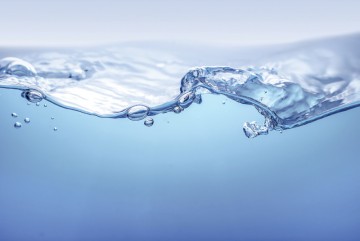10/12/2017, Munich

How would it be if maintenance of industrial gear units or automobile transmissions were to consist simply of topping up with mains water? If contaminations by lubricants could be eliminated without any problems using clear water? Not only would that render work in industrial plants safer and cleaner, but at a stroke all worries regarding the sustainability of the lubricant being used would be dispelled. This was the thinking behind Klüber Lubrication’s development of a concept that has the potential to revolutionise the future of specialty lubricants. The tribology experts have succeeded in developing homogeneous lubricants with functional water contents: the Hydro Lubricants.
“Compared with the present-day oil-based lubricants, water offers numerous important functional advantages: it is sustainable, globally available, non-toxic, and non-flammable”, explains Dr. Stefan Seemeyer, Head of Research and Product Development at Klüber Lubrication. “As a lubricant, it had up to now been of limited utility, since water is subject to certain physical and biological limitations, like evaporation and freezing points, oxidation or microbiological growth. By means of additives in the lubricant or technical solutions at the component concerned, however, these limits can be shifted, and the water-specific effects rendered beneficially usable. With a water-based product concept, we’ve even been able to reduce the friction involved far enough to bring the range of ‘superlubricity’ within reach.”
Water as a deliberately selected lubricant component offers entirely new possibilities, not least with the newly acquired sheer diversity of raw materials. Since water-soluble substances are not usually soluble in oil, they were well-nigh irrelevant in classical lubricant development. With innovative lubricant components of this kind, it is now possible to achieve performance parameters hitherto unattainable, like very good cooling properties or energy-savings thanks to significantly reduced friction.
The water-specific effects can likewise be rendered beneficially usable by technical solutions at the component itself. For example, evaporated water can be retained in the circuit inside an enclosed component, and even be used for cooling purposes. Another line of approach is to render usable the obvious properties of water, like electrical conductivity or cooling effects. This opens up entirely new options for many application categories, not least in the field of e-mobility.
“The speciality lubricant of the future will have to solve hitherto unknown challenges,” explains Michaela Wiesböck, Group Leader at Klüber Lubrication in the Research and Product Development Department. “In view of progressively more stringent expectations of lubricants in terms of performative capabilities, energy-efficiency and eco-compatibility on the one hand and the finitude of fossil raw materials on the other, the demand for innovative lubrication concepts based entirely on renewable raw materials is already becoming apparent.”
The Hydro Lubrication technology is meanwhile being used in the Klüberplus C 2 series. In this lubricant, conceived for conveyor belts, water and water-soluble oils form a homogeneous solution, which leads to improved metering of the lubricant, and thus to reducing the incidence of malfunctions in the production operation. This means, however, that Hydro Lubrication technology is only just beginning to explore its potentials. Together with cooperation partners from different sectors, Klüber Lubrication is currently working on Hydro Lubricants for applications in gear units, bearings, chains, and other components.
For further background information, videos and interviews on the subject please refer to https://www.klueber.com/de/schmierstoffe/hydro-lubricants/
